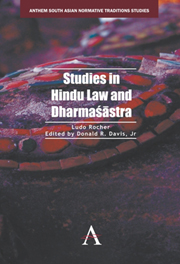Book contents
- Frontmatter
- Contents
- Foreword by Richard W. Lariviere
- Preface
- Abbreviations
- Note on the Edition
- Introduction
- PART ONE THE NATURE OF HINDU LAW
- PART TWO GENERAL TOPICS OF HINDU LAW
- PART THREE HINDU LEGAL PROCEDURE
- PART FOUR TECHNICAL STUDIES OF HINDU LAW
- Possession Held for Three Generations by Persons Related to the Owner
- The Vīramitrodaya on the Right of Private Defence
- The Technical Term Anubandha in Sanskrit Legal Literature
- The Kāmasūtra: Vātsyāyana's Attitude toward Dharma and Dharmaśāstra
- In Defense of Jīmūtavāhana
- Dāsadāsī
- The Definition of Vākparuṣya
- Janmasvatvavāda and Uparamasvatvavāda: The First Chapters on Inheritance in the Mitākṣarā and Dāyabhāga
- Karma and Rebirth in the Dharmaśāstras
- Notes on the Technical Term Sāhasa: “Fine, Pecuniary Penalty”
- Avyāvahārika Debts and Kautilya 3.1.1–11
- The Sūtras and Śāstras on the Eight Types of Marriage
- Caritraṃ Pustakaraṇe
- The Terms Niyukta, Aniyukta, and Niyoga in Sanskrit Legal Literature
- The Aurasa Son
- The Introduction of the Gautamadharmasūtra
- PART FIVE ANGLO-HINDU AND CUSTOMARY LAW
- Bibliography
- Index
In Defense of Jīmūtavāhana
from PART FOUR - TECHNICAL STUDIES OF HINDU LAW
Published online by Cambridge University Press: 05 February 2013
- Frontmatter
- Contents
- Foreword by Richard W. Lariviere
- Preface
- Abbreviations
- Note on the Edition
- Introduction
- PART ONE THE NATURE OF HINDU LAW
- PART TWO GENERAL TOPICS OF HINDU LAW
- PART THREE HINDU LEGAL PROCEDURE
- PART FOUR TECHNICAL STUDIES OF HINDU LAW
- Possession Held for Three Generations by Persons Related to the Owner
- The Vīramitrodaya on the Right of Private Defence
- The Technical Term Anubandha in Sanskrit Legal Literature
- The Kāmasūtra: Vātsyāyana's Attitude toward Dharma and Dharmaśāstra
- In Defense of Jīmūtavāhana
- Dāsadāsī
- The Definition of Vākparuṣya
- Janmasvatvavāda and Uparamasvatvavāda: The First Chapters on Inheritance in the Mitākṣarā and Dāyabhāga
- Karma and Rebirth in the Dharmaśāstras
- Notes on the Technical Term Sāhasa: “Fine, Pecuniary Penalty”
- Avyāvahārika Debts and Kautilya 3.1.1–11
- The Sūtras and Śāstras on the Eight Types of Marriage
- Caritraṃ Pustakaraṇe
- The Terms Niyukta, Aniyukta, and Niyoga in Sanskrit Legal Literature
- The Aurasa Son
- The Introduction of the Gautamadharmasūtra
- PART FIVE ANGLO-HINDU AND CUSTOMARY LAW
- Bibliography
- Index
Summary
Every student of Dharmaśāstra knows that Jīmūtavāhana's Dāyabhāga, which “is of paramount authority in modern British Indian courts in Bengal” (Kane 1930–1962: 1.322), defends the view that the head of the family is the sole owner of the joint family property. The other members do not acquire any proprietary rights, for instance by birth, as is the case in other Hindu “legal texts.” They only become owners at the time when the right of the present owner ceases to exist, by his death or otherwise.
Jīmūtavāhana himself (1.13) introduces a possible objection to this theory. The opponent states that in order to become the owner of an object, there has to be acquisition (arjana). And arjana is an activity (vyāpāra) on the part of the acquirer (arjayitṛ). Therefore, the acquirer acquires the status of an owner contingent upon his activity of acquisition. For instance, birth is an activity of the son (putravyāpāra); it constitutes acquisition of a proprietary right in the joint property. Consequently, the son acquires this right while his father is still alive, not after his father's death.
Jīmūtavāhana (1.21) refutes this objection. The activity of the acquirer does not make him the owner. A person's proprietary right can very well come into being by an act on the part of someone else:
anyavyāpāreṇānyasya svatvam aviruddham.
Consequently, the death of the father —literally, the father's act of dying— can create his son's proprietary right, without any activity on the part of the son.
- Type
- Chapter
- Information
- Studies in Hindu Law and Dharmasastra , pp. 497 - 502Publisher: Anthem PressPrint publication year: 2012



